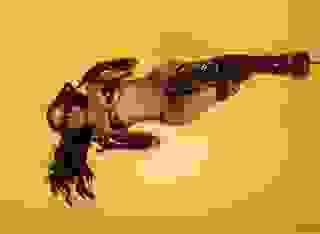- Sci-Fi & Fantasy
- The Fall of Eva Pryor Ch. 01
Note: You can change font size, font face, and turn on dark mode by clicking the "A" icon tab in the Story Info Box.
You can temporarily switch back to a Classic Literotica® experience during our ongoing public Beta testing. Please consider leaving feedback on issues you experience or suggest improvements.
Click hereShe believed in the capacity of Science to make things better. To make anything better. Even herself.
Eva Pryor, born October 25, 1854. Born the very day of the triumph at Balaclava, when the heroic British soldiers of the armoured cavalry overcame the Russian forces through a miraculous new invention, the steam-suit. Horseflesh replaced with legs of iron, horse-power overtop'd by steam-power: these mechanical suits were designed to carry our troops into the Valley of Death and bring them out alive again, all six hundred. Can it be called coincidence? The very hour that men's limbs struck out with a strength unheard of since the days of the Titans, Eva Pryor drew her first breath, and gave her first scream. Can it be called fate? The very moment General James Yorke Scarlett raised his steam-fist high in that famous, incredible distance-strike, Eva Pryor flung her small hands to the sky and, grasping at nothing, fell into such a life as is rarely known among women or men. Can it be called destiny? Or would we rather do better to call it a curse?
I pen this history of Miss Pryor from the sidelines. I should like to have been in the centre of her life. I tried, in the most pitiably earnest fashion, to place myself there. I followed her to the ends of the earth and back. I saved her life and she mine, and still she would not love me. She was grateful, yes. Gracious, yes. But always she kept her distance. Like the distance strike of the steam-suit, that was her effect on me. And no wonder, for she too was wrapped in struts and girders: her very own, more modest, steam-suit.
"She has a machine heart inside that machine body," gossips have whispered of her.
"That lady-doctor can make anything, except a man happy. She's cold as watchspring steel."
But I know Eva better. For her, metal was warm, close to the skin, at blood temperature. That was all she needed: her own self, her own mechanisms for self-fulfillment. That self-sufficiency was what I loved in her, and what I could never possess.
Ah well, I digress. This is a portrait of her, not of myself, and a dark enough portrait it is. Eva Pryor did not have an easy life. She was born, as I suggested, with a fall: from a mother beset by labour too early, from the slippery hands of the unprepared nursemaid to the stone floor, onto her fragile fishbone spine. Poor Eva, split from the start, as her mother was split by childbirth. The entire family, in fact, was sundered, her mother split open by her innocent babe and her father by a Cossack's sword in a skirmish in the Crimea. (May I claim simultaneity of instance again, or would it be too much to credit?) Though of decent breeding, her father was young and not an officer. He was too lowly to warrant the protection of the new armour. And so he went the way of the common solider, denied the glory of the Charge of the Light Armoured Brigade, leaving nothing behind to support his orphan daughter.
It is all the more ironic, then, that the daughter of this divided pair should become an icon of the technology of Unification. She was plucked from an orphanage hospital and from the verge of death by her designation as a suitable test subject for the ever-evolving trials of Science. The scientists and inventors took her in. They made a cage for baby Eva -or was it a trellis, a lattice for her body to grow through? Because grow she did. Though capable of but the most feeble movements on her own, she was nonetheless able to be moved by mechanisms that, through the action of many thin, flexible metal tab-levers, picked up and amplified the faintest vibration of her animal energies. These levers were affixed to articulated braces that clasped about her limbs, neck, torso, and hips. They formed a scaffolding that lent her the additional motive force she could not supply. It was powered by a miniaturized steam-engine of ingenious design, with cylinders and pistons so fine they seemed spun by fairy hands. She carried her engine at all times between her shoulder blades, housed in protective casing which diffused the steam so as to render its heat harmless. She fed it tiny pellets of some long-burning chymical substance about as often as she fed herself. It lent her a queer metallic scent and a quiet hum at each motion, but these were barely noticeable -at least, not after one grew accustomed to them.
As a child she moved spasmodically, on wild impulse and with an awkward gait. (I saw her from the garden shed where my father worked the grounds. I even met her several times when she snuck out to play with me, only to be found out and returned to the lab. I was fascinated by that lonely girl as only a lone boy can be. O, Eva.) Even as an adult, in moments of great excitement or in combat she gave the sense of being only just in control of her body's mechanism, as if she were rather throwing it forward, letting it fall, and catching it haphazardly at the last moment rather than directing it by her conscious will. She believed in her own perfectibility and worked hard for the smooth gait she affected in public. But I know the truth. Her true movement was falling, always falling, from birth until-well. We will get to that.
I encountered her again at a meeting of the Royal Geographical and Aeronautical Society in Saville Row. I knew her instantly, of course. How could I fail to recognize her? She was unmistakable, with her jet-black hair bound up on her crown, her strange violet-grey eyes, her strong lips, and her steam suit with its elegantly-jointed claws reaching out from the high collar of her dress to support the back of her neck. But she didn't know me, and I could not take the liberty of speaking to her. I felt I needed an acquaintance to make hers.
"Say, Kimmers," I said to my seat-mate, "would that lady seated alone in the second row happen to be Miss Pryor?"
"She would," said Miss Pryor without turning around. Poor Kimmers sat with his fish-lips hanging open. "Should you like to speak with her, you need ask no introduction. She does not stand on formality, if the topic is suitable for discussion here."
"And if it is not?" I returned.
A whir of gears. A shaded glance my way.
"Then it will have to be discussed elsewhere."
I walked over to her and half-bowed, half-mockingly.
"Benjamin D'Aville, madam, at your service here or elsewhere."
"Elsewhere, you say?" A gleam came into her storm-cloud eyes. "Of what service could you be in Constantinople?"
I started in surprise. You have to realize, in this age the Unification was still a controversial issue, and nowhere was opposition fiercer than the Ottoman Empire. Strengthened by their alliance with Great Britain's Armoured Brigades during the Crimean conflict against the Russians, the fading Ottomans shook off the dust of their Oriental decadence. I can attest firsthand that whatever corrupt portraits are painted now of the former Sultan Abdul Aziz, they truly built their glory anew in brass and Damascus steel in the three decades after 1856. They took the steam-suits developed for a brief three-year conflict and made them into a force worthy of their centuries-long military heritage. I could not help but admire that. Having reclaimed some of their former reach, they were, shall we say, reluctant to cede to any plan of global unification proposed by a British ruler, however beneficial the terms. It was of no consequence to the Turk that the defeated Russia, the Americas, the Empires of Nippon and China, and even, eventually, the French had joined the Unified Nations. The Sick Man of Europe was reborn. The Ottomans once again took hold of the reins in the rich lands of the Mediterranean, Northern Africa, and the Middle East. The Moslems in the many nations of that region were naturally inclined to the Ottoman view -as were a good many of us British citizens, who opposed the Crown's heavy-handed ways with anyone who dared speak a word against Unification . But of course, I could not reveal my hand here, in the very heart of the Royal Aeronautical Society.
"Constantinople is in a well-explored and settled region, Miss Pryor," I said carefully, glancing around. "Surely members of the Royal Geographical and Aeronautical society can have no interest in discovering a land already known to us. Now, Darkest Africa, where the zeppelins still cannot penetrate the treetops with the news of Unification—"
She shook her head and frowned, wrinkling her fine brow.
"Darkest Africa's men and women look darkly on such news, as well they ought," she murmured critically. I must admit, I looked around in some alarm. If anyone should hear such talk-!
"I see you have a desire to be out in the fresh air!" I blurted.
"How is that?"
"Your topic asks to be discussed in a more suitable elsewhere."
"Then lay on," she replied.
Together we walked through the winding streets of London 'taking the air,' as dim and smoky as it was. She strode easily, evenly, cutting through the passel of gearsmen and weavers leaving the factories as the shifts changed over. She did not say anything, not yet, but only walked, eyes distant as if thinking over a matter of great import. Finally, she guided us to a common worker's pub, a dark but lively spot crowded enough to dissolve talk like a suspension of salt in water. She drew her shawl over her telltale steam-pack and procured us a booth (which I now suspect she had on a permanent reservation.)
"I would not bring you here," she said with unsettling directness, "except that your reputation precedes you, Benjamin D'Aville. They say you are a talented linguist."
"I have a modest interest in languages, yes."
"34 languages. So they say."
"Oh, I can't claim fluency in all. I merely get along."
She tapped with two fingers on the table, a gesture which I later came to learn meant that she was irritated with niceties and wished me to speak as directly as she. I glanced down at her hands. Her long fingers, lined in brass...
"Persian."
"I beg your pardon?"
"Can you claim any fluency in Classical Persian? With some Turkish, possibly."
At the mention of Turkish, it all made sense.
"Ah. I see. You have something from the Ottomans. Miss Pryor, I must say-"
"Classical Persian, yes or no?"
"Well, yes. I have reading knowledge. But if this is material obtained by espionage conducted against the Ottoman Empire, I have a personal conviction, nay, an ethical duty to state that this policy regarding Unification in the Middle East is unconscionable, and-"
"Hussssh."
I am not sure whether it was she who breathed or her steam-suit.
"Your charmingly liberal 'personal convictions' are as well-known as your linguistic abilities, Mr. D'Aville. I am not here to test them. I am here to test your skill in deduction. If I tell you I have a letter in Classical Persian, what can you deduce from that?"
I paused and gave it thought. Indeed, I hadn't immediately associated the language with the Ottomans, which had thrown me off at first.
"It is odd. All official communications, internally and abroad, are made in the new rationalized Turkish. Indeed, I had heard Persian and other dialects were discouraged by the Imperial Education Acts some years back."
"Yes, go on."
For the first time, her interested seemed sparked. Her eyes locked on mine, but her expression was now encouraging rather than penetrating. She opened the lines up to her knowledge, inviting me in.
"So your letter-writer must be a Localist, and well-educated in an older tradition. Someone opposed to Ottoman Imperialism as much as Unification. Perhaps a scholar of ancient literatures, or a poet."
"Well, on that last count you are wrong. She is a scientist like myself -though now that I think on it, she may also be trained in classics and has written literary works in the past."
Miss Pryor conceded this last with a tilt of her head in my direction. I nodded back, and, emboldened, continued.
"Very well then. You have a scientific contact in the Ottoman underground, who also seems to be something of a political radical. Now you have a letter from her in Classical Persian which you cannot read. If I may ask, how is it that you communicated with her before this?"
"She had a translator on her end who encoded her letters such that I could read them. But he turned out to be unreliable."
"Unreliably loyal?"
"Unreliably living."
"Well, then."
There was a pause as she let the implications settle in. She was giving me the opportunity to back out of something dangerous. But she had me by my most vulnerable part: my curiosity.
"Will you show me the letter?"
She deliberated and I guessed that it must be deliberately, as she did not seem one to begin a course of events without having an idea of their ending. Finally, she said,
"Yes. But I don't have it with me. We must go back to my lab."
~~~~~~~~~~~~~~
Eva Pryor's lab. It was a place of miracles. One might expect a scientist's lab to resemble a darksome garret strewn about with vials and bunsen burners, odd mechanisms bursting out of every corner and dust hanging in shafts of pale, eerie light. But her lab was as orderly as an orrery. It was bright, spacious, and clean. Everything was packed away safe in its own little drawer or shelf or net. Her wooden worktop was deeply scarred, criss-cross'd by myriad lines, but it was tidy. The porcelain sinks were aseptically white and the copper piping polished to a shine. A scent of ammonia and, more faintly, of steam-ozone hung in the air. Curiously, there was no decoration, no perfume, nothing at all feminine to mark this as a lady's abode. I could not help but wonder what sort of bedchambers a woman such as Miss Pryor might keep. But if she suspected the direction of my thoughts, she did not play to it in the least. She did not invite me into the parlour, nor even do so much as offer me a cup of tea. Dispensing with the niceties of Society, she left me standing by the worktop and went directly over to a heavy mahogany writing desk that stood against the wall.
She did something, then, that she shielded from me. She brought herself low against the desktop, one ebony lock falling from its bun onto the glossy surface. Her arm and shoulder blocked my view, but she moved in some way against the furniture, as if pressing her breast to it. Her arms locked and I heard her steam-suit whine as it tightened around her arched back. Then she twisted, and with that motion there came the sound of a complex series of tumblers falling. With a ratcheting click, the desk opened. I do not mean that the drawer opened. If it had been merely that, I would not labour the point. I mean that the desk entire unfolded itself before my eyes, like one of those ingenious paper flowers the aeronauts send from Nippon. I frankly gaped. For the first time in our brief acquaintance, she seemed flushed.
"My private papers," she murmured, brushing stiff bindings with soft fingers. "And my correspondence."
Here for once was disarray: letters she was clearly in the middle of writing were leaved one on top of the other. She pulled a thick, heavy sheaf of papers from the top, dislodging several other bound sheaves, which slid soundlessly to the floor behind the desk. I thought to alert her, but some 'Imp of the Perverse' whispered to me: 'Hush and wait. Wait out your opportunity.' And so I ignored the fallen papers.
"Very well," said I aloud. "Let us have a look at this Classical Persian and see what we can make of it."
Miss Pryor nodded more agreeably than I'd seen her to date and brought the papers she'd extracted over to me. She spread them on the worktop.
"Here are the pages from our previous correspondence, which I have decoded, and here is the most recent missive in the original. I've also run it through our cipher, here, but I cannot read the language. In the past she has sometimes used French, which I can understand, but this time for some reason it is Persian."
She set the pages before me and stood close by, practically leaning over my shoulder, as if my gaze alone would translate the text before her eyes. She was so near to me that I felt the warmth of her portable steam-engine and the brush of the leather harness and corset that supported it. The room felt close. I tugged my cravat, then took up her deciphered pages.
"Ah, yes, let's see. To begin. A-hem. She addresses you as 'Dearest Arjuna.'"
"A meaningless code-name," Miss Pryor interjected hurriedly.
"Well-chosen. The root means 'silver,' as in argentum. A metal warrior."
"I know what she calls me. What does she say?"
"Your contact-" I scanned the document for its signature "-'Ulupi' says that her translator has been benighted? Hmm, assassinated, most likely. Killed by night. She is under observation. Oh, yes, this explains why she's written the letter out like poetry. You see here how she's broken up the lines to make it appear as though she's writing in verse? Perhaps she means to make it look like a lover's missive to a Turkish man that she writes in Persian out of modesty, as we would do with French."
She shifted but let me go on.
"Under observation. Yes. She says next that those who serve the cause of the Phoenix are building their pyre -she is very eclectic in her range of reference- and the flames will consume us all unless you-"
Here I stopped, blushing.
"What is it?"
"She has taken poetic license. I believe she is requesting you to go to her aid. But she phrases it colourfully."
"Tell me her exact words. This is important."
"She wishes you to meet her at the source -la source, she writes here in French- to, ah, join with her in acts of a physical nature that will generate the birth of a third."
"She writes precisely that? I must join with her in physical union at the source to generate the birth of a third?"
"In so many words. Er. Yes."
It was as if a spring were released, setting her into action. Immediately she strode from the room. Her heeled boots echoed on wood, then on stone, leaving me abandoned.
"Miss Pryor?"
"Close the desk, Mr. D'Aville, and kindly bring those papers to me! I will call you a hansom cab this moment."
"Whatever for?"
After a pause, her head reappeared through the door-frame. From across the room she pierced me with a serious gaze.
"So that you can return to your apartments and make your choice. Either you pack for travel and leave with me tonight, or you stay and do what you will here. I won't force you or encourage you either way. I only offer. If you wish, come with me to Constantinople. But do it now or not at all."
I hung in the suspension of uncertainty for only the briefest moment. If you have ever hung in Miss Pryor's gaze, you will know why.
"I'll come." I said suddenly, almost surprising myself. "Gather what you need. I will put my own affairs in order and return at once."
A nod, a flicker of skirts, and she was gone. I collected her Ottoman correspondence hastily, wondering how it was that she could trust me so soon either to come with her or to stay behind and keep her secrets. I wondered because I was about to betray her trust. The Imp had spoken and would not be denied its opportunity.
I gave her back her Ottoman correspondence. But I left with a good-sized pack of Miss Pryor's private papers.
It was a portion of her diary I found that day, fallen so quietly behind her desk. The pages were dated some five or six years previous. Insatiably curious as I was, I read the first entry in the cab on the way to my apartments. I haven't got the papers in her hand any more. Those were lost, in the course of events. But I committed them to memory as the only glimpse I ever had into the heart of that strange lady. I will record them now to unburden myself and to savour them one more time.
She wrote:
'It is true that I give myself to no man nor woman, but it is not out of shame. I have no need. All my needs are satisfied by the struts that support me, burnished to a satin-finish and warmed to blood temperature by their continual closeness around and between my limbs. They satisfy my need to move. To explore. To sustain and educate myself. And yes, my other needs. Those too. For the sake of scientific observation, as I've been trained, let me write it out.








